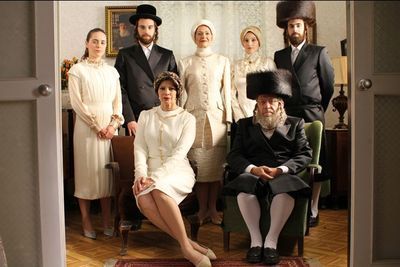Filling voids
By TOBY LICHTIG
Saudi Wahhabism and Haredi Judaism are not natural bedfellows, but the two cultures have a great deal in common: ancient traditions, conservative values, a literalist approach to scripture, a preoccupation with what women (and men) should and shouldn't wear (and eat and drink and enjoy), who they should and shouldn't fraternize with and marry. Two recent films have explored these notoriously insular communities with fascinating results – particularly when compared.
Earlier this year, I reviewed Haifaa al-Mansour's Wadjda (the first feature film to be shot entirely in Saudi Arabia), starring a ten-year-old girl whose pursuit of a bicycle (a forbidden symbol of freedom) is played out against the wider story of her parents' marriage – its monogamy under threat following the revelation that the wife can no longer bear children. The film is affectionate about Saudi life while remaining resolutely feminist: a tricky balance in a culture that makes such a daily drama out of subjugating women.
More recently, at this month's UK Jewish Film Festival, I went to see Fill the Void, which recalls Wadjda in both style and theme. Firstly, the look of Rama Burshstein's film is very similar, being made up largely of interiors within a single home. When the camera creeps into the outside world, the effect is jarring. In Wadjda, Riyadh is bathed in dazzling light; in Fill the Void, Tel Aviv seems bizarrely otherworldly in its familiarity. Ordinary teenagers skulk at bus stops and listen to their iPods – a world away from the intimations of eighteenth-century Poland (albeit in a comfortably modernized incarnation) seen behind the closed doors of the Haredi family home. Here, the men, viewed at various gatherings and festivals (most memorably a bibulous Purim celebration), resolutely club together; so do the women, gossiping in the kitchen, preparing food, clucking around the children. This isn't to say that that there isn't overlap – but it is noticeable in both films quite how much people rely on members of their own sex.
Fill the Void (which originally came out last year in Israel as Lemale et Ha'halal) also centres on a proposed marriage considered necessary to the community, if not by the bride-to-be. The film stars Hadas Yaron as Shira, who is encouraged to marry her sister's husband (Yochay; played by Yiftach Klein) after his wife dies in childbirth (the baby survives). There is no question that Yochay must remarry (a man cannot bring up a child alone, perish the thought) and it is deemed expedient to keep Yochay and the infant within the family (there is talk of an alternative match for the widower in far-off Antwerp). Despite her reluctance, Shira is gradually pressured into the marriage by her mother and the local shadchan (matchmaker) – although not by her sympathetic father – the narrative following the twists and turns of her difficult decision as she finds herself caught between social mores and personal volition.
Like the family in Wadjda, Shira's home environment is loving and relatively liberal. The portrayal is warm – but also subtly subversive. It ends ambiguously, on Shira's wedding day, with the young bride half-terrified as she prepares to undress before her husband (Shira is eighteen; Yochay a decade older).
Both films are very good at investigating the control of female bodies in strict religious households, where marriage is considered to be a matter for the whole community – a public event from inception to consummation and beyond. In both, it is the interfering women (mothers and mothers-in-law) who perpetuate this control over other women. The men, by contrast, are portrayed as mild, almost feckless. If women are to have a chance of throwing off the shackles, we are shown, other women will need to take the lead. It is in their very gentleness, their empathy, that both films explore this entirely logical message – one that in its context comes across as little less than radical.
Peter Stothard's Blog
- Peter Stothard's profile
- 30 followers




